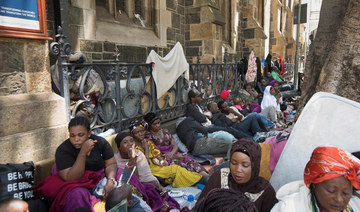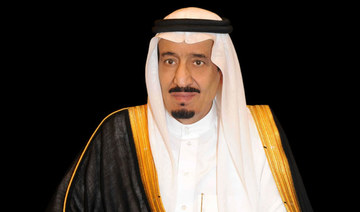JOHANNESBURG/LONDON: Moody’s left South Africa on the brink of “junk” status on Friday after it revised the outlook on the country’s last investment-grade credit rating to “negative,” piling pressure on President Cyril Ramaphosa to quicken the pace of reform.
Moody’s said the outlook revision on its ‘Baa3’ rating, the lowest rung of investment grade, was motivated by a deterioration in the economic growth outlook and rising debt.
Analysts had expected the move after a bleak mid-term budget statement this week that slashed this year’s growth forecast to 0.5 percent and showed government debt racing to more than 70 percent of gross domestic product by 2023.
The rand tumbled more than 2.5 percent over the past week against the dollar, its sharpest weekly drop since early August. Yields on local 10-year government bond issues traded on Monday at just over 8 percent but climbed as high as 8.6 percent following the dire budget predictions.
The negative outlook means there is a window of 12-18 months in which a downgrade could be delivered, but it could come sooner if Moody’s isn’t impressed by the fiscal picture presented at the next budget statement in February.
“The development of a credible fiscal strategy to contain the rise in debt, including in the 2020 budget process and statement, will be crucial to sustain the rating at its current level,” Moody’s said in a statement after South African financial markets had closed.
It added that its new outlook reflected rising concern that the government would not find “the political capital to implement the range of measures it intends, and that its plans will be largely ineffective in lifting growth.”
The finance ministry responded by saying the country had “a narrow window to demonstrate faster and concrete implementation of reforms.”
Ramaphosa has struggled to revive Africa’s most advanced economy since taking over from scandal-plagued Jacob Zuma in February 2018.
The wave of optimism among foreign and local investors that accompanied his rise to power has fizzled out as the economic challenges have grown more acute, with unemployment reaching an 11-year high above 29 percent and state power company Eskom struggling to keep the lights on.
One of the greatest worries is rising government debt, which shows no signs of stabilizing soon amid repeated bailouts for state-owned companies.
Fund managers said they were not expecting a steep sell-off in government bonds and the rand when financial markets re-open on Monday, because the outlook revision was expected by so many and South African assets had fallen sharply over the past week.
The spread of South African dollar debt over US Treasuries is already wider than on some junk-rated sovereigns, reflecting longstanding concerns over the country’s fiscal health.
“Valuations are already reflecting this outcome. So, on any sell-offs, we would see it as a buying opportunity,” said Jean-Charles Sambor, deputy head of emerging market fixed income at BNP Paribas Asset Management.
S&P Global and Fitch already moved South Africa’s debt to sub-investment level in 2017, when the country was embroiled in corruption scandals under Zuma.
A move to “junk status” from all three agencies typically increases a government’s cost of borrowing by raising the premium that investors demand to hold its debt. It could also see South Africa evicted from the benchmark World Government Bond Index of local-currency debt, which could trigger billions of dollars of passive outflows.
Phoenix Kalen, director of emerging markets strategy at Societe Generale, said South Africa was now in the “last-chance saloon” and that it had to stabilize its debt.
“This will be a Herculean task,” Kalen said, citing financial pressures at state companies among causes for concern.
Ramaphosa’s government has promised Eskom 230 billion rand ($15.3 billion) of bailouts over the next decade, on top of a 59 billion rand “special appropriation” over the next two fiscal years. But analysts say it will need more state money than that.
Kevin Lings, chief economist at asset manager Stanlib, said a downgrade in 2020 was now his “base case” and that some investors would be reluctant to buy South African debt until the downgrade had happened.
“Next year is going to be marked by consistent uncertainty around the currency and bond markets, it’s going to put South Africa under a lot of strain,” he said.
Moody’s leaves South Africa teetering on brink of ‘junk’
Moody’s leaves South Africa teetering on brink of ‘junk’
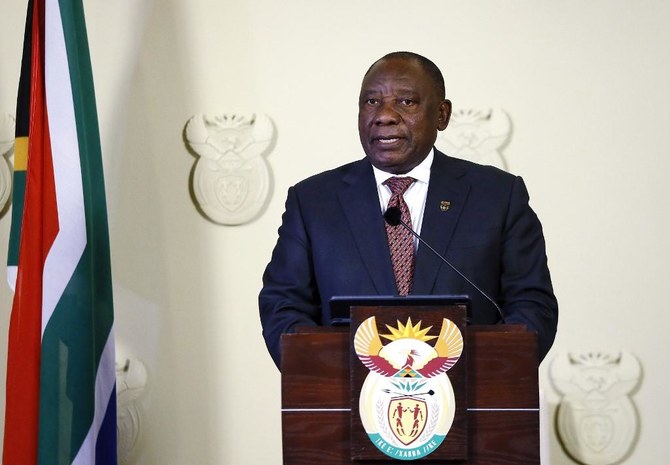
- Moody’s said the outlook revision on its ‘Baa3’ rating, the lowest rung of investment grade, was motivated by a deterioration in the economic growth outlook and rising debt
A blast near a ship off Yemen may mark a new attack by Houthi rebels after a recent lull
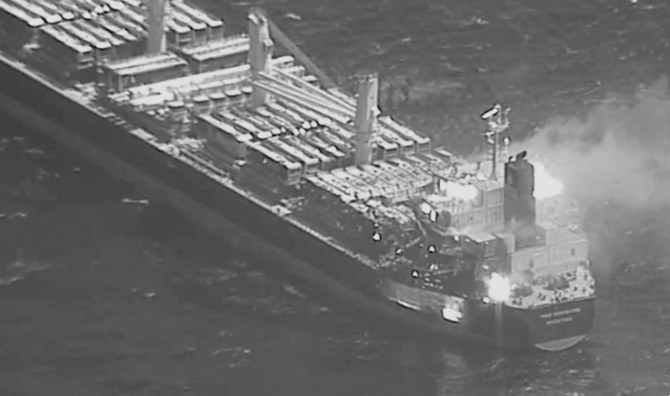
- Houthis have launched more than 50 attacks on shipping, seized one vessel and sank another since November
- The explosion happened some 130 kilometers southeast of Djibouti in the Gulf of Aden
JERUSALEM: A ship near the strategic Bab el-Mandeb Strait saw an explosion in the distance Wednesday, marking what may be a new attack by Yemen’s Houthi rebels through the crucial waterway for international trade.
The explosion, reported by the British military’s United Kingdom Maritime Trade Operations center, comes after a relative lull from the Houthis after they launched dozens of attacks on shipping in the region over Israel’s ongoing war on Hamas in the Gaza Strip.
The Houthis did not immediately claim responsibility for the blast, but suspicion fell on the group as they’ve repeatedly targeted ships in the same area. It typically takes the Houthis several hours before acknowledging their assaults.
The explosion happened some 130 kilometers southeast of Djibouti in the Gulf of Aden.
“The master of a merchant vessel reports an explosion in the water a distance form the vessel,” the UKMTO said. “Veseel and crew reported safe. Authorities are investigating.”
The private maritime security firm Ambrey separately reported the apparent attack.
The Houthis have launched more than 50 attacks on shipping, seized one vessel and sank another since November, according to the US Maritime Administration.
Houthi attacks have dropped in recent weeks as the rebels have been targeted by a US-led airstrike campaign in Yemen and shipping through the Red Sea and Gulf of Aden has declined because of the threat. American officials have speculated that the rebels may be running out of weapons as a result of the US-led campaign against them and firing off drones and missiles steadily in the last months.
The Houthis have said they would continue their attacks until Israel ends its war in Gaza, which has killed more than 34,000 Palestinians there. The war began after Hamas-led militants attacked Israel on Oct. 7, killing 1,200 people and taking some 250 others hostage.
The ships targeted by the Houthis largely have had little or no direct connection to Israel, the US or other nations involved in the war. The rebels have also fired missiles toward Israel, though they have largely fallen short or been intercepted.
The assaults on shipping have raised the profile of the Houthis, who are members of Islam’s minority Shiite Zaydi sect, which ruled Yemen for 1,000 years until 1962. The group seized Sanaa, Yemen’s capital, in late 2014. A Saudi-led coalition has been battling the group in a stalemated conflict since 2015.
PM Sharif on maiden visit to Karachi since assuming Pakistan’s premiership
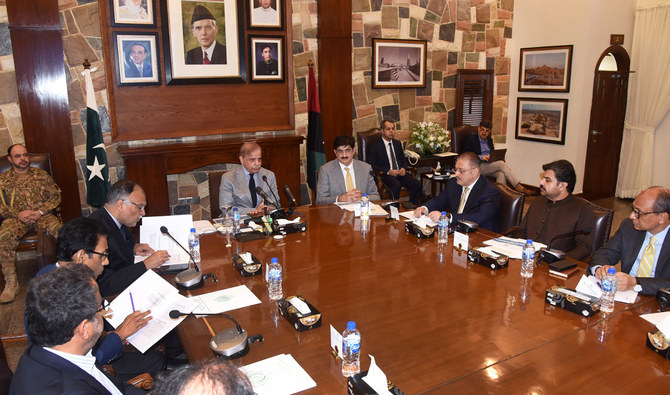
- Pakistan’s prime minister discusses financial and administrative matters with Sindh governor, chief minister
- Sharif announces additional 150 buses for Karachi, describes city’s business community as Pakistan’s “backbone“
KARACHI: Prime Minister Shehbaz Sharif arrived in Pakistan’s financial hub Karachi on Wednesday on his maiden trip to the city since assuming the top political office, where he held meetings with the provincial leadership and the business community.
Sharif, who is in Karachi for a day-long visit, visited the mausoleum of Muhammad Ali Jinnah, Pakistan’s founder, to pay his respects after arriving in the city.
“The prime minister will exchange views with the governor of Sindh and its chief minister on Sindh province’s overall political situation and administration matters,” a statement from Sharif’s office said.
Sharif presided over a meeting at the Chief Minister House later in which he was informed about the financial matters between the center and the province.
The chief minister’s spokesperson informed Sharif that the center owed Sindh a whopping Rs1,078.198 billion yet it had handed over Rs28 billion less than that.
“The prime minister instructed the federal finance minister to speak to the chief minister and resolve financial matters,” the chief minister said.
Sharif later announced the addition of 150 buses in Karachi to a fleet of 300, which the provincial government aims to deploy to alleviate the people’s transport woes.
“On the insistence of transport minister, Sharjeel Inaam Memon, prime minister announced 150 buses in the pool of 300 buses,” Abdul Rasheed Channa, the Chief Minister’s House spokesperson said, adding that the prime minister praised the provincial transport department.
Karachi, one of the largest cities in the world with a population of 20.3 million people, has 25,000 buses operating on over 700 routes covering the city. The number of private buses has decreased to 300 which operate on only 50 routes.
The prime minister later spoke to Karachi’s prominent businesspersons, referring to them as “the backbone of Pakistan’s economy.”
“We should rise before our personal likes and dislikes to serve Pakistan,” he said, adding that he wanted to carve out the best business policies for Pakistan to improve the country’s financial health.
Pakistan trains hundreds of volunteers ahead of annual Hajj pilgrimage
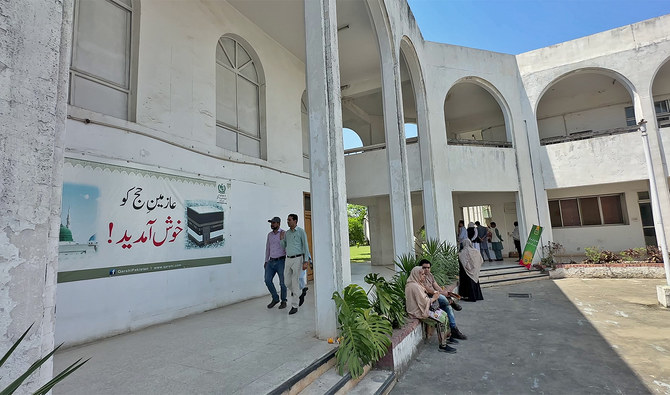
- Hajj is one of the five pillars of Islam and every adult Muslim is required to undertake it at least once in their lifetime
- Islamabad is to begin its Hajj flight operation from May 9 that would conclude on June 9 and facilitate over 63,000 pilgrims
ISLAMABAD: The Pakistani government has started training hundreds of volunteers ahead of the annual Hajj pilgrimage to help thousands of pilgrims overcome language barrier and other challenges in Saudi Arabia, besides imparting training to intending pilgrims on how to perform Hajj rituals.
Pakistan has a Hajj quota of 179,210 pilgrims this year. Of them, 63,805 pilgrims will be performing the pilgrimage under the government scheme, while the rest would be accommodated by private tour operators, according to the Pakistani religious affairs ministry. The South Asian country is set to start its Hajj flight operation on May 9, which would conclude on June 9.
The ministry conducts training of Hajj assistants and pilgrims every year ahead of their departure to Saudi Arabia to make sure the whole process, including their food, transportation and accommodation, is managed efficiently. This year, Pakistan will be sending 550 Hajj assistants and 400 doctors and paramedical staff to Saudi Arabia to facilitate the pilgrims.
“The training programs are currently underway at district and tehsil level and Islamabad is one of them,” Noor Muhammad Soomro, a deputy director at the Hajj directorate in Islamabad, told Arab News.
“Ministry of Religious Affairs has made very good arrangements for the pilgrims, and this includes Pak Hajj app. If a pilgrim uses the Pak Hajj app, he gets all the details, including training, vaccination, maps.”
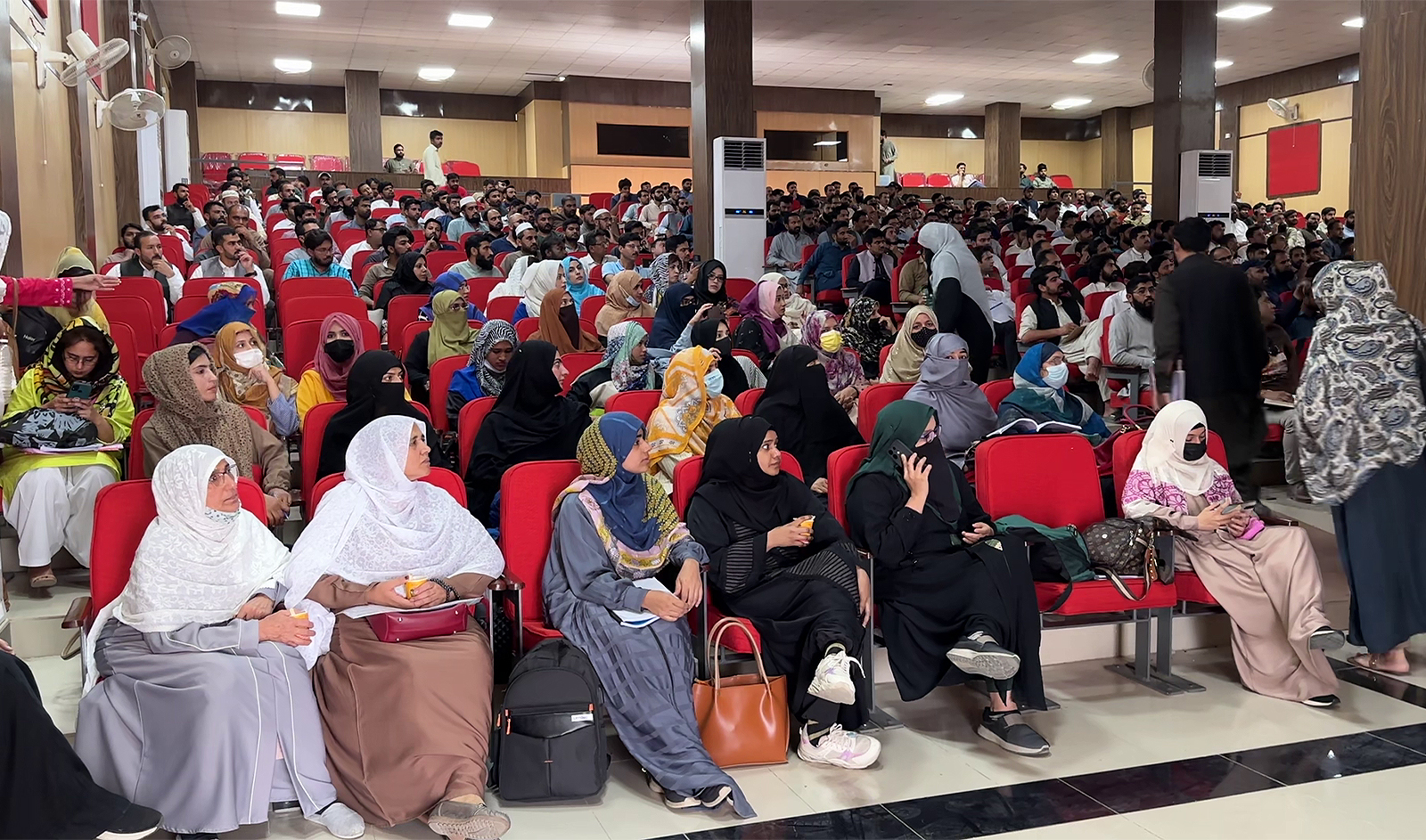
Soomro said each Pakistani pilgrim would be provided with a SIM card having 7GB data to connect with their families back home.
“This time, we will provide the train facility to all those pilgrims who travel to Saudi Arabia on the government scheme in Mina, Arafat and Muzdalifah,” he said.
Hajj is an annual Islamic pilgrimage that has been in practice for over 1,400 years. It is one of the five pillars of Islam and requires every adult Muslim to undertake the journey to the holy Islamic sites in Makkah at least once in their lifetime if they are financially and physically able. This year’s pilgrimage is expected to run from June 14 till June 19.
Instructors have been training Hajj assistants and intending pilgrims at a sprawling auditorium at the Islamabad Hajji Camp, where they can also visit different stalls to purchase Hajj items like Ihram, umbrella and towels.
“This training is basically the introduction of the duties of Hajj,” Sanober Khaliq Baloch, a Hajj assistant, told Arab News. “Hajj assistants would be performing those duties for example the induction [of the pilgrims], the transport, the food and obviously about Mina map, a little about the roads and traveling, all these things.”
Speaking about the potential challenges, she said the temperature difference and up to 14 hours of duty could be “daunting,” but she was determined to facilitate the pilgrims in all possible way.
Faisal Hafeez, another Hajj assistant, said he was committed to serve the pilgrims well by taking care of their food, accommodation and transportation.
“Different problems that confront the pilgrims have been discussed here [during the training] and how we are supposed to deal with them and solve the problems,” he told Arab News.
Syeda Munir, who is going to perform Hajj for the first time, praised the training sessions, saying this would help them smoothly perform all rituals.
“This is my third [training] session,” she told Arab News. “They guide us well about how to perform Umrah and Hajj.”
Saudi Environment Ministry launches first urban farm inside stores
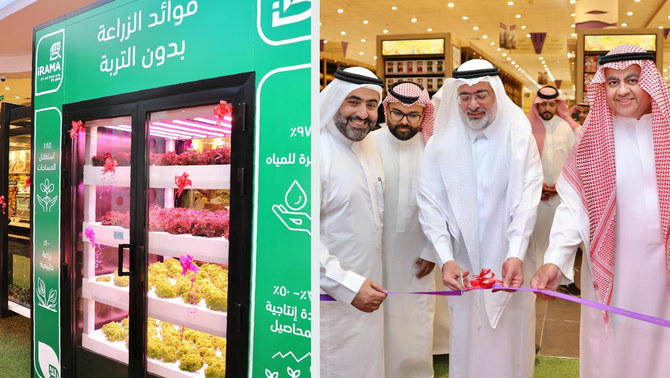
- Initiative allows customers to obtain fresh food products grown in the Kingdom.
- The ministry aims to launch about 600 to 1,000 farms in the retail system across all markets in the Kingdom over the next five years
Riyadh: The Ministry of Environment, Water and Agriculture launched an urban vertical farm project for food markets and stores, the Saudi Press Agency reported.
The initiative, the first of its kind in the region, allows customers to obtain fresh food products grown in the Kingdom.
The ministry’s undersecretary, Ahmed Al-Eyada, attended the launch of the project, which was implemented by a leading bioagriculture company.
Danube markets in Riyadh is hosting the first vertical farm in the project. Commercial display units in the market contain a variety of plants and agricultural products, such as lettuce, coriander, parsley and broccoli — many of which were previously sourced from abroad.
The ministry aims to launch about 600 to 1,000 farms in the retail system across all markets in the Kingdom over the next five years. These farms are intended to meet 20 to 40 percent of domestic demand for agricultural products and vegetables.
Vertical urban farms in stores aim to preserve natural resources, maintain ecosystem balance and promote sustainable productivity. By shortening supply chains, they also reduce loss and waste, and introduce a new farming model suited to local farmers and businesses in the Kingdom.
The initiative offers multiple benefits for consumers by providing high-quality vegetables and fruits that retain their freshness and nutritional value for up to five times longer than traditional methods, the SPA reported.
Urban farms also promote job localization and greater income potential. Furthermore, they help overcome logistical challenges associated with transporting agricultural products to consumers.
Vertical farming not only conserves agricultural land but also reduces labor and water usage by 80 to 90 percent compared to traditional farming, providing a year-round high-yield agricultural environment.
Pakistan and Iran call on UN Security Council to curb Israel’s hostile behavior in Middle East
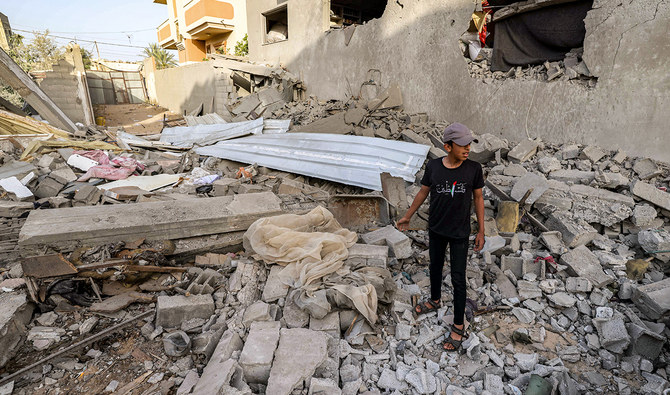
- The two countries issued a joint statement after Iranian President Ebrahim Raisi wrapped up three-day visit to Pakistan
- Pakistan and Iran agree to adopt a collaborative approach to confront militant violence through institutional mechanism
ISLAMABAD: Pakistan and Iran urged the United Nations Security Council in a joint statement issued on Wednesday to prevent Israel’s hostile acts toward regional countries, noting that the behavior of Prime Minister Benjamin Netanyahu’s administration was further escalating tensions in the Middle East. The joint statement was circulated by Pakistan’s foreign ministry after Iranian President Ebrahim Raisi concluded his three-day visit to the South Asian state in which he held several high-level meetings in Islamabad, Lahore and Karachi. The Iranian president arrived in Pakistan on Monday as the two Muslim neighbors sought to mend ties after unprecedented tit-for-tat military strikes earlier this year. The visit also took place at a time when tensions remain high in the Middle East after Iran launched airstrikes on Israel a week ago and Israel retaliated with its own attack on Friday. The joint Pakistan-Iran statement condemned Israel’s attack on the Iranian Embassy in Damascus on April 2, calling it an unacceptable violation of the sovereignty of Syria that undermined its stability and security. It also pointed out the attack was a violation of international law and the UN Charter, constituting an illegal act under the Vienna Convention on Diplomatic Relations of 1961. “Recognizing that the irresponsible act of the Israeli regime forces was a major escalation in an already volatile region, both sides called on the UN Security Council to prevent Israel regime from its adventurism in the region and its illegal acts attacking its neighbors and targeting foreign diplomatic facilities,” the statement noted. It added the two sides condemned Israel’s aggression against the Palestinian people, along with the inhumane blockade of Gaza, while seeking a just, comprehensive and durable solution to the issue based on the aspirations of the people of Palestine. Pakistan and Iran agreed to adopt a collaborative approach to confront militant violence and to leverage the existing bilateral institutional mechanisms to effectively combat and counter the threat, while fully upholding the principles of the UN Charter, particularly the principles of sovereignty and territorial integrity of member states. “Both sides also acknowledged the key role of enhanced economic and commercial opportunities in improving the security environment in the border areas,” the joint statement added. It mentioned the consensus to fully operationalize barter trade mechanisms between the two countries to facilitate bilateral economic and commercial activities. Both countries reiterated the importance of cooperation in the energy domain, including trade in electricity, power transmission lines and Iran-Pakistan (IP) gas pipeline project. “The two leaders agreed to boost their bilateral trade to USD10 billion over the next five years,” the statement said.



